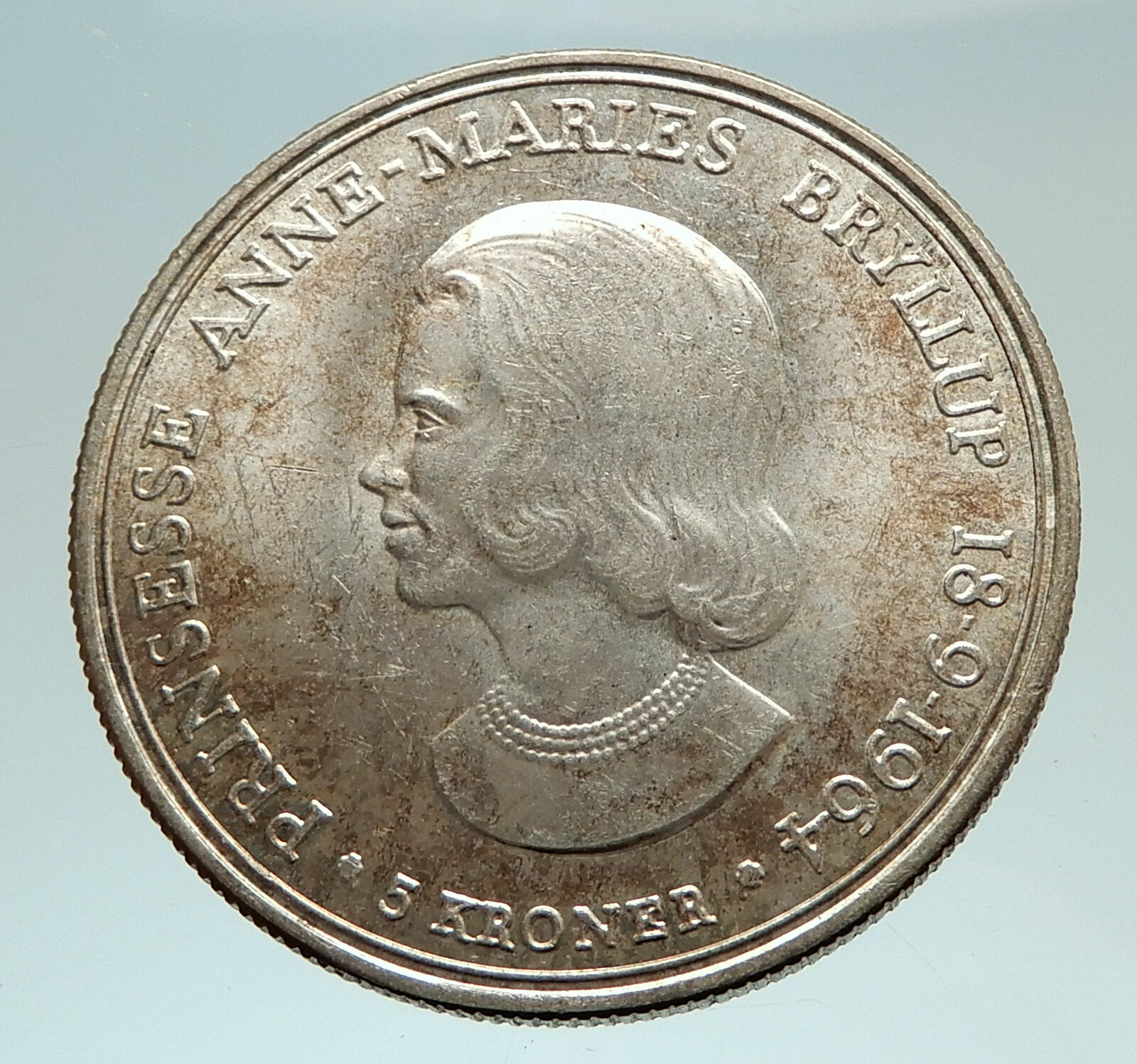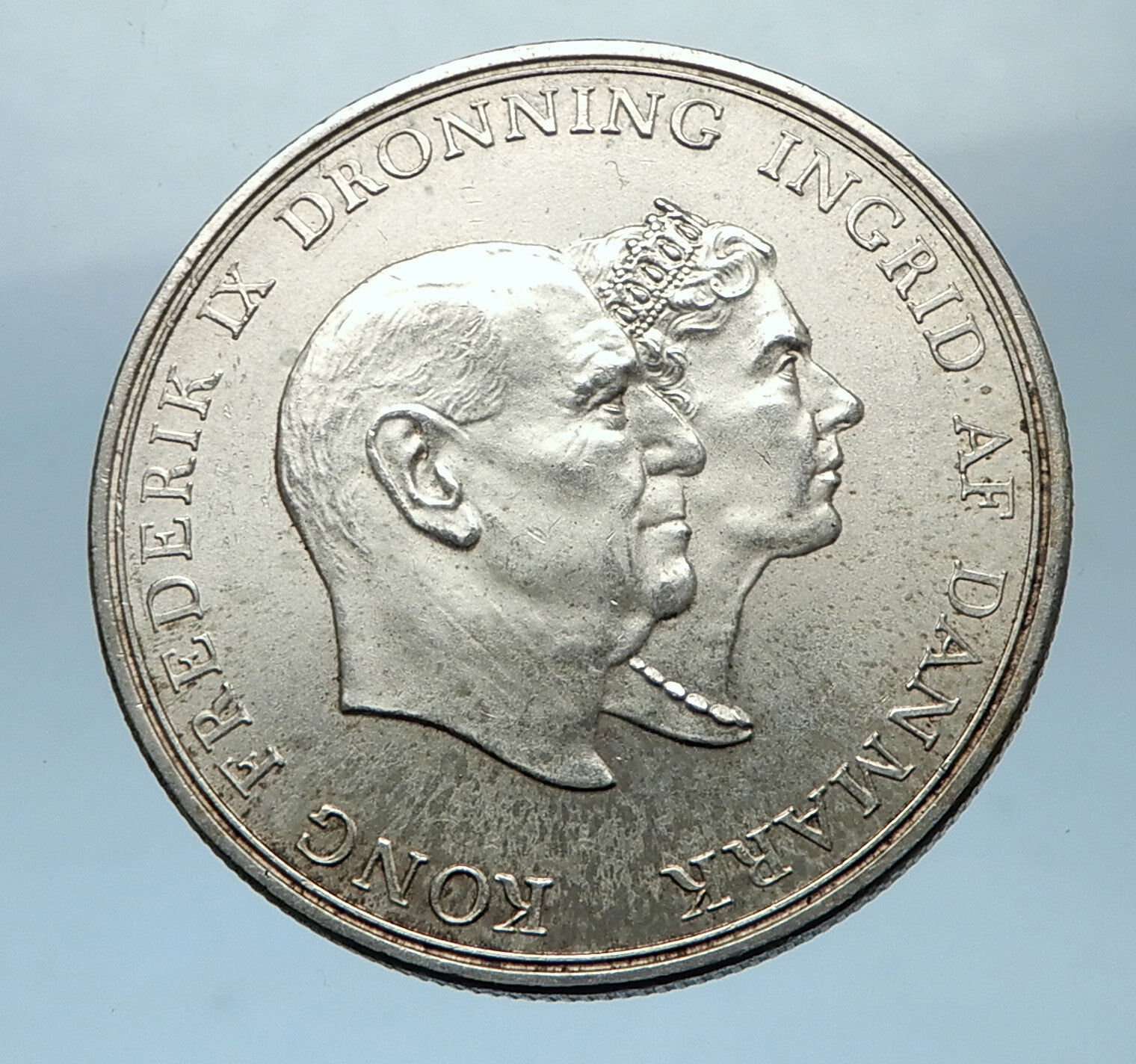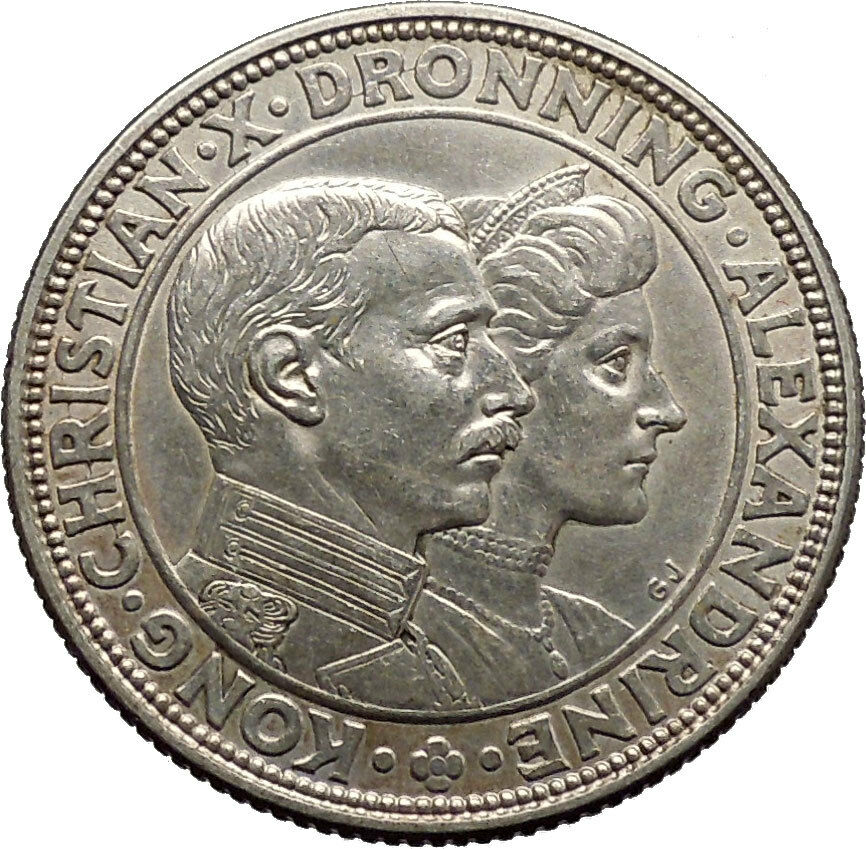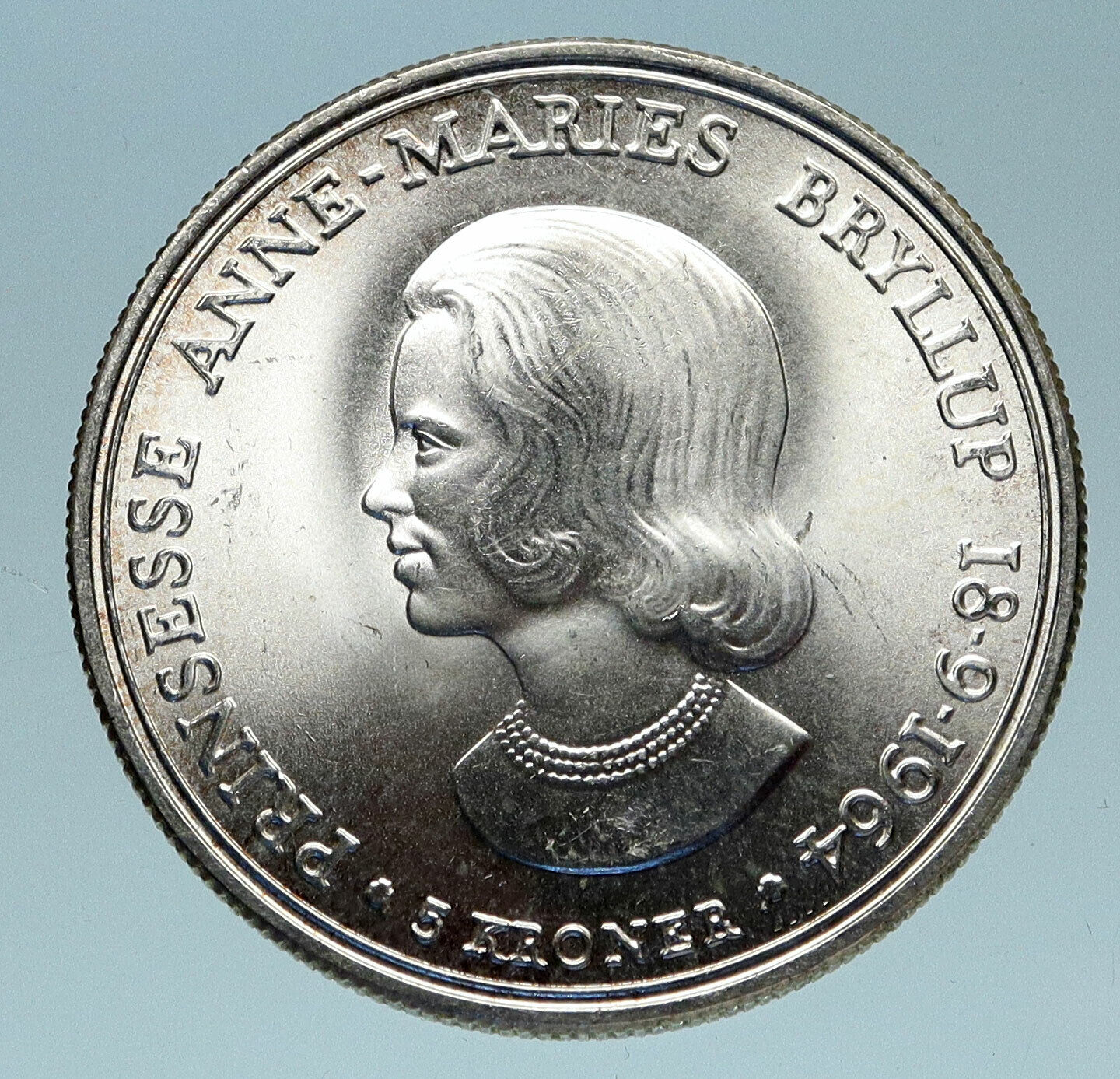|
Denmark
under Christian X – King of Denmark: 14 May 1912 – 20 April 1947 King of Iceland: 1 December 1918 – 17 June 1944
King Christian X’s 60th birthday
1930 Silver 2 Kroner 31mm (15.00 grams) 0.800 Silver (0.3858 ASW)
Reference: KM# 829
CHRISTIAN X KONGE AF DANMARK ♥ 1930 N., Christian facing right.
1870-1930 2 KRONER DANMARK, Coat of arms draped and supported.
You are bidding on the exact item pictured, provided with a Certificate of Authenticity and Lifetime Guarantee of Authenticity.
 Christian X (Christian Carl Frederik Albert Alexander Vilhelm; 26 September 1870 – 20 April 1947) was the King of Denmark from 1912 to 1947 and the only king of Iceland (where the name was officially spelled Kristján), between 1918 and 1944. Christian X (Christian Carl Frederik Albert Alexander Vilhelm; 26 September 1870 – 20 April 1947) was the King of Denmark from 1912 to 1947 and the only king of Iceland (where the name was officially spelled Kristján), between 1918 and 1944.
He was the third Danish monarch of the House of Glücksburg and the first member of his family since king Frederick VII to have actually been born into the Danish royal family; both his father and his grandfather were born as princes of a German ducal family. Among his siblings was King Haakon VII of Norway .
His character as a ruler has been described as authoritarian, and he strongly stressed the importance of royal dignity and power, in spite of the growing importance of democracy. His reluctance to embrace democracy resulted in the Easter Crisis of 1920 , in which he dismissed the democratically elected cabinet with which he disagreed, and instated one of his own choosing. This was nominally his right in accordance with the constitution, but facing the risk of the monarchy being overthrown he was forced to accept democratic control of the state and the role as a nominal constitutional monarch.
In spite of becoming unpopular due to his resistance to democracy, during the German Occupation of Denmark he did become a popular symbol of resistance to German occupation, particularly because of the symbolic value of the fact that he rode every day through the streets of Copenhagen unaccompanied by guards. He also became the subject of a persistent urban legend according to which, during Nazi occupation, he donned the Star of David in solidarity with the Danish Jews . This is not true, as Danish Jews were not forced to wear the Star of David. However, the legend likely stems from a 1942 British report that claimed he threatened to don the star if this was forced upon Danish Jews. This is also supported by the king’s personal diary, where the following entry can be found:
When you look at the inhumane treatment of Jews, not only in Germany but occupied countries as well, you start worrying that such a demand might also be put on us, but we must clearly refuse such this due to their protection under the Danish constitution. I stated that I could not meet such a demand towards Danish citizens. If such a demand is made, we would best meet it by all wearing the Star of David.
In addition, he helped finance the transport of Danish Jews to unoccupied Sweden , where they would be safe from Nazi persecution.With a reign spanning two world wars, and his role as a rallying symbol for Danish national sentiment during the German Occupation, he has become one of the most popular Danish monarchs of modern times.
Accession
On 14 May 1912, King Frederick VIII died after collapsing from shortness of breath whilst taking a walk in a park in Hamburg , Germany . He had been returning from a recuperation stay in Nice , France , and was staying anonymously in the city before continuing to Copenhagen . Christian was in Copenhagen when he heard about his father’s demise and ascended the throne as Christian X.
Death of the king
On his death in Amalienborg Palace , Copenhagen , in 1947, Christian X was interred along other members of the Danish royal family in Roskilde Cathedral near Copenhagen. Although he had been behind the politics of Erik Scavenius, a cloth armband of the type worn by members of the Danish resistance movement was placed on his coffin at castrum doloris.
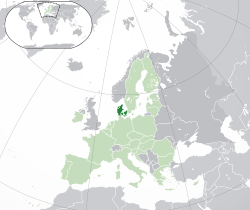
 Denmark is a Scandinavian country in Europe. The southernmost of the Nordic countries, it is southwest of Sweden and south of Norway, and bordered to the south by Germany. The Kingdom of Denmark is a sovereign state that comprises Denmark proper and two autonomous constituent countries in the North Atlantic Ocean: the Faroe Islands and Greenland. Denmark has an area of 42,924 square kilometres (16,573 sq mi), and a population of 5.7 million. The country consists of a peninsula, Jutland, and an archipelago of 443 named islands, of which around 70 are inhabited. The islands are characterised by flat, arable land and sandy coasts, low elevation and a temperate climate. Denmark is a Scandinavian country in Europe. The southernmost of the Nordic countries, it is southwest of Sweden and south of Norway, and bordered to the south by Germany. The Kingdom of Denmark is a sovereign state that comprises Denmark proper and two autonomous constituent countries in the North Atlantic Ocean: the Faroe Islands and Greenland. Denmark has an area of 42,924 square kilometres (16,573 sq mi), and a population of 5.7 million. The country consists of a peninsula, Jutland, and an archipelago of 443 named islands, of which around 70 are inhabited. The islands are characterised by flat, arable land and sandy coasts, low elevation and a temperate climate.
 The unified kingdom of Denmark emerged in the 10th century as a proficient seafaring nation in the struggle for control of the Baltic Sea. Denmark, Sweden and Norway were ruled together under the Kalmar Union, established in 1397 and ending with Swedish secession in 1523. Denmark and Norway remained under the same monarch until the union was dissolved by outside forces in 1814. The deterioration of the Kingdom of Norway, caused by the Black Death, made it possible for Denmark to inherit an expansive colonial empire from this union-of which the Faroe Islands and Greenland are remnants. Beginning in the 17th century, there were several cessions of territory; these culminated in the 1830s with a surge of nationalist movements, which were defeated in the 1864 Second Schleswig War. Denmark remained neutral during World War I. In April 1940, a German invasion saw brief military skirmishes while the Danish resistance movement was active from 1943 until the German surrender in May 1945. An industrialized exporter of agricultural produce in the second half of the 19th century, Denmark introduced social and labour-market reforms in the early 20th century that created the basis for the present welfare state model with a highly developed mixed economy. The unified kingdom of Denmark emerged in the 10th century as a proficient seafaring nation in the struggle for control of the Baltic Sea. Denmark, Sweden and Norway were ruled together under the Kalmar Union, established in 1397 and ending with Swedish secession in 1523. Denmark and Norway remained under the same monarch until the union was dissolved by outside forces in 1814. The deterioration of the Kingdom of Norway, caused by the Black Death, made it possible for Denmark to inherit an expansive colonial empire from this union-of which the Faroe Islands and Greenland are remnants. Beginning in the 17th century, there were several cessions of territory; these culminated in the 1830s with a surge of nationalist movements, which were defeated in the 1864 Second Schleswig War. Denmark remained neutral during World War I. In April 1940, a German invasion saw brief military skirmishes while the Danish resistance movement was active from 1943 until the German surrender in May 1945. An industrialized exporter of agricultural produce in the second half of the 19th century, Denmark introduced social and labour-market reforms in the early 20th century that created the basis for the present welfare state model with a highly developed mixed economy.
The Constitution of Denmark was signed on 5 June 1849, ending the absolute monarchy which had begun in 1660. It establishes a constitutional monarchy-the current monarch is Queen Margrethe II-organised as a parliamentary democracy. The government and national parliament are seated in Copenhagen, the nation’s capital, largest city and main commercial centre. Denmark exercises hegemonic influence in the Danish Realm, devolving powers to handle internal affairs. Denmark became a member of the European Economic Community (now the EU) in 1973, maintaining certain opt-outs; it retains its own currency, the krone. It is among the founding members of NATO, the Nordic Council, the OECD, OSCE, and the United Nations; it is also part of the Schengen Area.
Danes enjoy a high standard of living and the country ranks highly in some metrics of national performance, including education, health care, protection of civil liberties, democratic governance, prosperity and human development. The country ranks as having the world’s highest social mobility, a high level of income equality, is the least corrupt country in the world, has one of the world’s highest per capita incomes, and one of the world’s highest personal income tax rates. A large majority of Danes are members of the Lutheran State Church, though the Constitution guarantees freedom of religion.
|





 Christian X (Christian Carl Frederik Albert Alexander Vilhelm; 26 September 1870 – 20 April 1947) was the King of Denmark from 1912 to 1947 and the only king of Iceland (where the name was officially spelled Kristján), between 1918 and 1944.
Christian X (Christian Carl Frederik Albert Alexander Vilhelm; 26 September 1870 – 20 April 1947) was the King of Denmark from 1912 to 1947 and the only king of Iceland (where the name was officially spelled Kristján), between 1918 and 1944.
 Denmark is a Scandinavian country in Europe. The southernmost of the Nordic countries, it is southwest of Sweden and south of Norway, and bordered to the south by Germany. The Kingdom of Denmark is a sovereign state that comprises Denmark proper and two autonomous constituent countries in the North Atlantic Ocean: the Faroe Islands and Greenland. Denmark has an area of 42,924 square kilometres (16,573 sq mi), and a population of 5.7 million. The country consists of a peninsula, Jutland, and an archipelago of 443 named islands, of which around 70 are inhabited. The islands are characterised by flat, arable land and sandy coasts, low elevation and a temperate climate.
Denmark is a Scandinavian country in Europe. The southernmost of the Nordic countries, it is southwest of Sweden and south of Norway, and bordered to the south by Germany. The Kingdom of Denmark is a sovereign state that comprises Denmark proper and two autonomous constituent countries in the North Atlantic Ocean: the Faroe Islands and Greenland. Denmark has an area of 42,924 square kilometres (16,573 sq mi), and a population of 5.7 million. The country consists of a peninsula, Jutland, and an archipelago of 443 named islands, of which around 70 are inhabited. The islands are characterised by flat, arable land and sandy coasts, low elevation and a temperate climate. The unified kingdom of Denmark emerged in the 10th century as a proficient seafaring nation in the struggle for control of the Baltic Sea. Denmark, Sweden and Norway were ruled together under the Kalmar Union, established in 1397 and ending with Swedish secession in 1523. Denmark and Norway remained under the same monarch until the union was dissolved by outside forces in 1814. The deterioration of the Kingdom of Norway, caused by the Black Death, made it possible for Denmark to inherit an expansive colonial empire from this union-of which the Faroe Islands and Greenland are remnants. Beginning in the 17th century, there were several cessions of territory; these culminated in the 1830s with a surge of nationalist movements, which were defeated in the 1864 Second Schleswig War. Denmark remained neutral during World War I. In April 1940, a German invasion saw brief military skirmishes while the Danish resistance movement was active from 1943 until the German surrender in May 1945. An industrialized exporter of agricultural produce in the second half of the 19th century, Denmark introduced social and labour-market reforms in the early 20th century that created the basis for the present welfare state model with a highly developed mixed economy.
The unified kingdom of Denmark emerged in the 10th century as a proficient seafaring nation in the struggle for control of the Baltic Sea. Denmark, Sweden and Norway were ruled together under the Kalmar Union, established in 1397 and ending with Swedish secession in 1523. Denmark and Norway remained under the same monarch until the union was dissolved by outside forces in 1814. The deterioration of the Kingdom of Norway, caused by the Black Death, made it possible for Denmark to inherit an expansive colonial empire from this union-of which the Faroe Islands and Greenland are remnants. Beginning in the 17th century, there were several cessions of territory; these culminated in the 1830s with a surge of nationalist movements, which were defeated in the 1864 Second Schleswig War. Denmark remained neutral during World War I. In April 1940, a German invasion saw brief military skirmishes while the Danish resistance movement was active from 1943 until the German surrender in May 1945. An industrialized exporter of agricultural produce in the second half of the 19th century, Denmark introduced social and labour-market reforms in the early 20th century that created the basis for the present welfare state model with a highly developed mixed economy.

